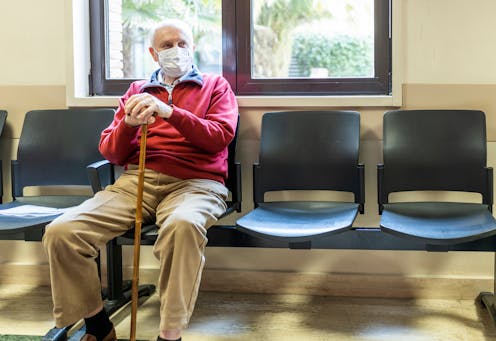It’s so hard to see a doctor right now. What are my options?
- Written by Anthony Scott, Professor of Health Economics, Monash University

Deciding whether to wait and see if your health condition improves or go to a GP can be a difficult task. You might be unsure about where to go, whom to see, how much it will cost and whether you’ll need to take time off work.
These choices can create significant barriers to accessing health care in Australia. There is often limited information available about the pros and cons of the different options. Often, we stick to what we know, unaware of better alternatives.
But making the wrong decision about how to access care can impact both your health and finances. So what are your options? And what policy reforms are needed to improve affordable access to care for all Australians?
How quickly can I be seen?
Access depends on how long it takes you to speak to a GP, or be seen in an emergency department, or by a community pharmacist, or a nurse practitioner whom you can see directly. Access depends on where you live and the time of day.
The rise of telehealth means GPs now get paid to talk to you on the phone, which is great for many minor ailments, medical certificates, repeat scripts or getting test results. Call centres such as Healthdirect[1] have been available for some time and now virtual emergency departments[2] can also see you online.
There are even GPs who only provide their services online[3] if you can pay. A phone call can save you valuable time. Before COVID, you needed to take half a day off work to see a GP, now it takes five to ten minutes and the GP even calls you.
Things get more tricky outside of normal working hours and at weekends – appointments are harder to come by, it is unlikely you will be able to see a GP whom you know, and out-of-pocket costs might be higher.
If you can’t wait, your local emergency department is likely to be more accessible, or you might be lucky enough to live near a bulk-billed Medicare urgent care clinic[4], where you don’t need an appointment. Tomorrow’s federal budget will include[5] funding for another 29 urgent care clinics, on top of the 58 already operating.
But things are much worse if you live if a rural or remote area, where choice is limited and you need to wait much longer for GP appointments or travel long distances. Telehealth helps but can be expensive if it is not with your usual doctor.
Who will I see?
Access depends on who you will see. At the moment, this will usually be your GP (or, depending on the severity of your health concern, your community pharmacist or local emergency department staff). But to see your preferred GP you might need to wait as they are usually very busy.
But a review[7] of “scope of practice” in primary care aims to free up GPs’ time and use their skills more effectively.
So in future, you could receive more of your health care from qualified nurses, nurse practitioners, pharmacists and other health professionals.
But which tasks can be delegated to other health professionals is a significant bone of contention for GPs. For GP practices facing significant cost pressures, safely delegating tasks to other less costly health professionals also makes good business sense.
Read more: We're only using a fraction of health workers' skills. This needs to change[8]
How much will it cost?
Access depends on out-of-pocket costs. Bulk billing of GP services reached a peak of 89.6%[9] in the September quarter of 2022 but plummeted to 76.5% by the September quarter of 2023.
Last November, bulk billing incentives for children under 16 and those on concession cards were tripled, and between November and December 2023 bulk billing had increased[10] from 76.5% to 77.7%.
They key issue for patients is that it remains uncertain whether a GP will bulk bill you. You often don’t know this until you get into the consultation, at which point you can’t back out. Unless the whole practice bulk bills and so it is guaranteed, it’s entirely up to the GP whether you are bulk billed. It’s difficult to think of any other service where you don’t know how much you will pay until after you have used it.
How can policymakers improve access to care?
Government policies to strengthen primary care have focused on giving patients improved access through telehealth, urgent care clinics and Strengthening Medicare[12] initiatives, which are currently being developed.
But uncertainty surrounding out-of-pocket costs can deter people from seeking medical attention, or delay care or go instead to the emergency department or urgent care clinic where there is no out-of-pocket cost.
Cost is a factor[13] that leads to 20% of those with a mental health problem and 30% of those with chronic disease to delay or avoid visiting a health professional. Those most in need are more likely to miss out on necessary visits and prescriptions, sometimes with disastrous consequences. A recent study[14] shows people can die if they stop heart medications due to increased out-of-pocket costs.
The next task for policymakers should be developing policies to guarantee there are no out-of-pocket costs for those on low incomes. This could be a worthwhile investment in our health and should be included in tomorrow’s budget.
References
- ^ Healthdirect (www.healthdirect.gov.au)
- ^ virtual emergency departments (www.vved.org.au)
- ^ online (www.instantscripts.com.au)
- ^ urgent care clinic (www.health.gov.au)
- ^ will include (www.smh.com.au)
- ^ Hananeko_Studio/Shutterstock (www.shutterstock.com)
- ^ review (www.health.gov.au)
- ^ We're only using a fraction of health workers' skills. This needs to change (theconversation.com)
- ^ 89.6% (www.health.gov.au)
- ^ increased (www.health.gov.au)
- ^ National Cancer Institute/Unsplash (unsplash.com)
- ^ Strengthening Medicare (www.health.gov.au)
- ^ Cost is a factor (www.abs.gov.au)
- ^ study (academic.oup.com)
Read more https://theconversation.com/its-so-hard-to-see-a-doctor-right-now-what-are-my-options-229191

















